September 28th, 2012 § § permalink

Another comic Paul Gravett covers in his Previews is Self Made Hero’s edition of David Prudhomme’s prizewinning graphic novel Rebetiko, in a wonderful translation by Nora Mahony, who also did David B.’s Black Paths and Frédérik Peeters and Pierre-Oscar Lévy’s Sandcastle for them.
Prudhomme takes us through a day and night of carousing, womanizing, hashish-smoking, and music-making for a group of four musicians during which life decisions are made and reaffirmed.  The characters are all based on real people: Piraeus’s famous rebetiko band comprising Markos Vamvakaris, Giorgos Batis, Anestos Delias and Stratos Payioumtzis. Prudhomme replaced Payioumtzis with a character called Stavros, who in many ways resembles Yiannis Papaioannou (though he never played with any of the members in that group). The story takes place in Athens, October 1936, a few months into the military regime of Ioannis Metaxas. As Matthias Wivel writes in The Comics Journal,
“Their hashish-driven, devil-may-care lifestyle is fully congruent with later rock ’n’ roll-archetypes, and is given an acute edge by their dislocation from the new political order. Targets of suspicion and subject to censorship by the authorities for their subversive lyrics and Ottoman-derived music, they become romantic anti-establishment figures for Prudhomme. The story thus shows them in conflict with the police, with the gangsters sharing their immediate environment and with capitalism in the form of an American A&R man hoping to record and preserve their unique music for a mass audience.â€
The right wing persecuted rebetiko, considering it an expression of the proletariat, while the left also lambasted it for “contributing to the decline of the working classes, the left had a duty to exalt.†Perhaps most famously in America we owe rebetiko the song “Misirlou,†re-popularized in the ‘90s by Pulp Fiction.
I enjoyed working on an excerpt of this book for Words Without Borders in 2010. With lyrics writ large and floating ghostly over scenes of darkened café interiors, it provides a new formal take on that old challenge of representing music, or at least musicality, in comics. Kim Deitch does it well; Prudhomme provides the suggestion of sung words that escape or transcend the balloons containing speech (and less popularly these days, thought). As if the spoken word (or thought) had parameters, a bounded discourse, while lyrics, approximately diegetic and superimposed on successive panels, belong to everyone in the room. » Read the rest of this entry «
September 23rd, 2012 § § permalink
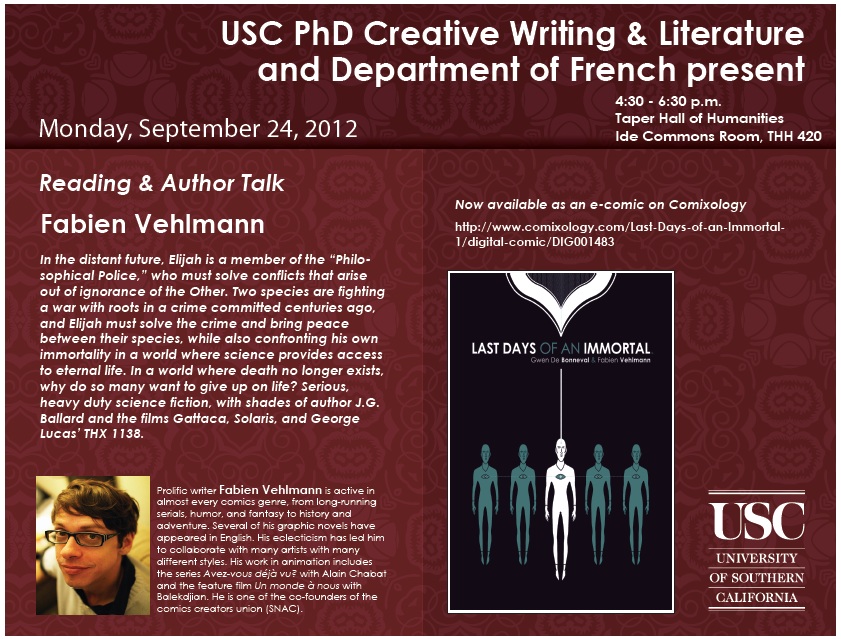
With live sci-fi ambient sound accompaniment by David Eng!!
September 21st, 2012 § § permalink
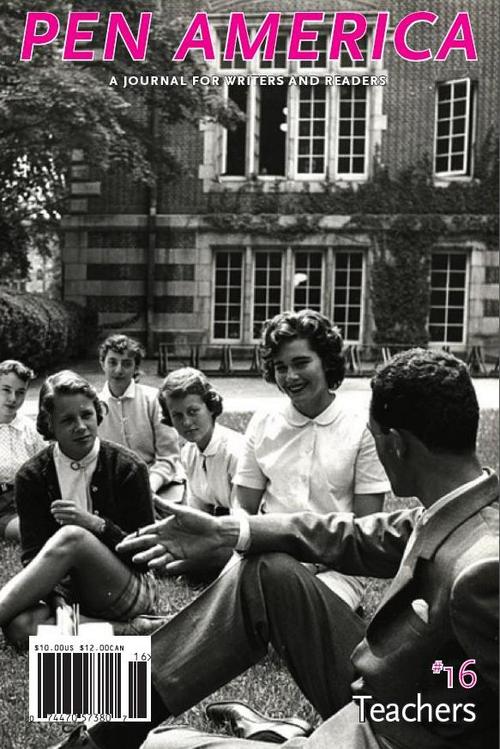
So I got the latest issue of PEN America in the mail yesterday, #16. Turns out I’m in it! I had no idea, but—cool!
Or rather, my translation of David B. and Jean-Pierre Filiu is: the first chapter from the recent Best of Enemies, an excerpt that puts quotes from Cheney and Bush into the mouths of Enkidu and Gilgamesh, and ends on a tableau comparing the human pyramids of Abu Ghraib to the Sumerian Stele of the Vultures.
The theme of this issue is Teachers. For a moment, I’m going to be one of those annoying people who say things like, that song about breaking up came out just when I was going through a bad breakup in my life, and it’s like the artist wrote it especially for me! But teaching has been much on my mind of late, since this fall is the first time I’ve had to in ten years, and my first time ever teaching French. There are also neat pieces by Harry Mathews, Julio Cortázar, John Cage, Etgar Keret, Margaret Atwood, and a comic by Brian Evensonand Zak Sally. Check it out!
September 19th, 2012 § § permalink

A Chinese Life is getting some notice, at Comic Book Resources and from Brit comics guru Paul Gravett. On his August Previews page, Gravett also draws attention to Little White Duck: A Childhood in China, a graphic novel from Lerner. Lerner published my translation of A Game for Swallows, to which Gravett also gives the nod. Little White Duck, by Na Liu and her husband, artist Andrés Vera MartÃnez, coming from a female perspective, would make a great companion read to A Chinese Life. From the publisher:
The world is changing for two girls in China in the 1970s. Da Qin – Big Piano – and her younger sister, Xiao Qin – Little Piano- live in the city of Wuhan with their parents. For decades, China’s government had kept the country separated from the rest of the world. When their country’s leader, Chairman Mao, dies, new opportunities begin to emerge. Da Qin and Xiao Qin soon learn that their childhood will be much different than the upbringing their parents experienced. Eight short stories – based on the author’s own life – give readers a unique look at what it was like to grow up in China during this important time in history.
September 17th, 2012 § § permalink
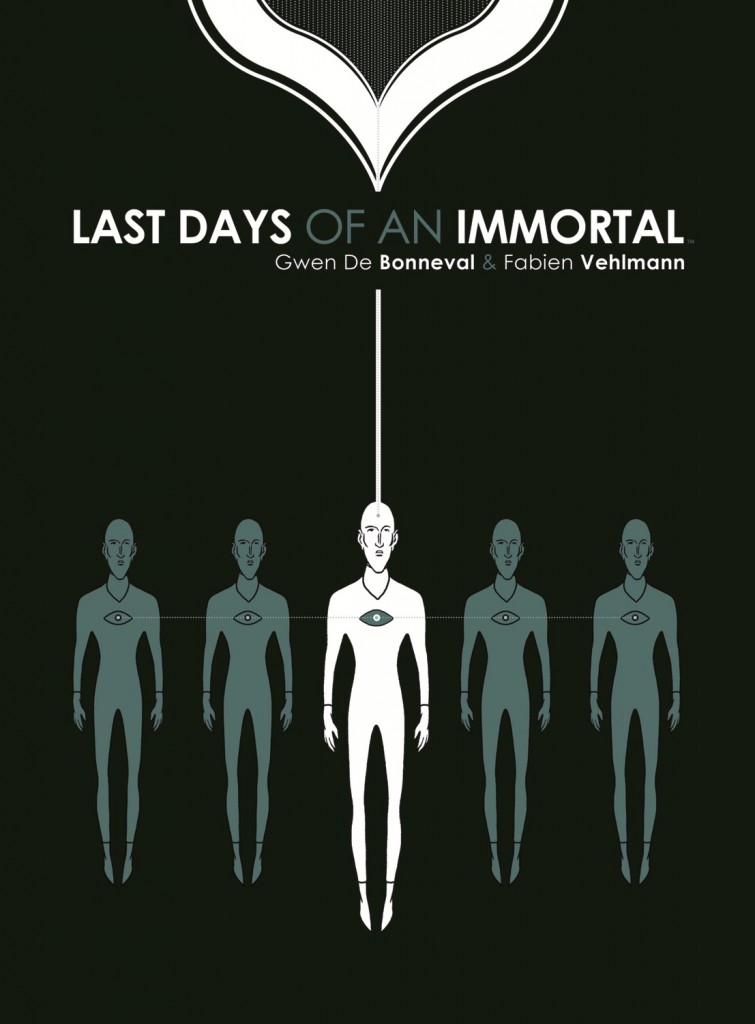
Come join comics writer Fabien Vehlmann as he reads from the far-future SF graphic novel The Last Days of an Immortal, with art by Gwen de Bonneval!
Two tour dates in L.A. so far:
- Monday, 9/24, 4:30pm at the University of Southern California, Taper Hall Room 420. 3501 Trousdale Parkway, Los Angeles, CA 90089
Prolific French comics and animation writer Fabien Vehlmann will read from a projection of his digital graphic novel The Last Days of an Immortal, now available at Comixology (print version hits stores in October from Archaia Entertainment). Vehlmann wrote, and Gwen de Bonneval provided the art for this contemplative far-future science fiction tale, reminiscent of the work of Stanislaw Lem, which probes issues of genocide, first contact, cloning, and mortality. It took top prize for best graphic novel at the international science fiction convention Utopiales.
Readings will be followed by an audience Q&A. Refreshements will be served.
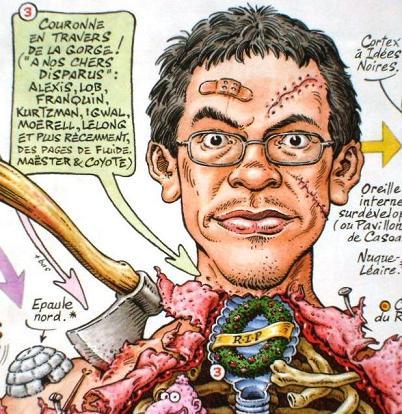
Solé cross-sections Fabien Vehlmann, finding references to Fluide glacial.
Fabien Vehlmann has written in almost every comics genre, from long-running serials (Seuls, Spirou & Fantasio), humor (Dieu qui pue Dieu qui pète), and fantasy (Wondertown) to history (Le Marquis d’Anaon) and adventure (Voyage en Satanie). Several of his graphic novels have appeared in English: The Island of 10,000 Graves (Fantagraphics), Green Manor (Cinebook), Seven Psychopaths (BOOM! Studios). His eclecticism has led him to collaborate with many artists with many different styles. His work in animation includes the series Avez-vous déjà vu? with Alain Chabat and the feature film Un monde à nous with Balekdjian. He is one of the co-founders of the comics creators union (SNAC).

September 15th, 2012 § § permalink
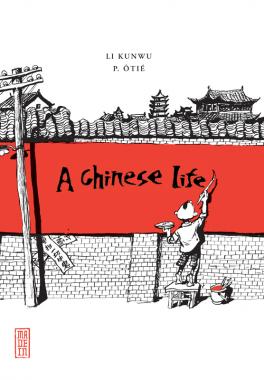
just dropped in stores this month, all 700 pages of it. Originally published in 3 volumes from 2009 to last year, this hybrid of personal and national memoir chronicles what is perhaps one of the most recent and massive dramatic upheavals in global history that most of us in the West still know very little about. And yet the last half-century of China’s development is something that surely affects us all already. As publisher Self Made Hero puts it:
“Li Kunwu spent more than 30 years as a state artist for the Communist Party. He saw firsthand what was happening to his family, his neighbors, and his homeland during this extraordinary time. Working with French diplomat Philippe Ôtié, the artist has created a memoir of self and state, a rich, very human account of a major historical moment with contemporary consequences.â€
In this graphic novel, the modern Middle Kingdom, closed for so long, opens at last to provide a very personal glimpse. Li’s supple technique ranges from echoes of traditional art, flawless propaganda reproductions, and an original, often tortured expressionist style where distortions in face and figure reflect inner turmoil. One of many stunning achievements in art and story is the way he makes palpably credible just how it is so many people thought and acted as one. When the first volume ends with an announcement of Mao’s death, the grief and terror of the populace is one of the book’s most harrowing moments. This trauma is echoed in the second book with the death of Li’s father, a Party official. Despite being interned in a re-education camp for ten years, his last words to his son are, heartbreakingly, no personal message but a political exhortation toward the Party. The personal and political are intertwined in a way we in the West have too long had the perilous luxury of ignoring.

Li and Ôtié © Photo Alain Dewez - Le Soir de Bruxelles
» Read the rest of this entry «
September 14th, 2012 § § permalink
is strewn with scraps of energy bar wrappers. Six of us share twelve chairs on casters, usually disposed with random cliquishness, like strangers at a cocktail party. There are three desktops and two printers, none of which work; a dead phone, and through a locked door the gurgle of a boiler. Equipment has crawled here to die: monitors, bookends, the hard discarded core of a roll of scotch tape… The unlabeled cabinets hold umbrellas, tote bags, stacks of dittos; who can say if these were stored this morning or left behind last year? A few coffee mugs, ringed with ageless residue, pin down used paper plates in an upended box top by the door.
Unattended
children will be
given espresso
and a free puppy.
reads a photocopied sign. On one shelf old pedagogies slump mummified in old editions beside paperback classics used bookstores would refuse. The torn cardboard sleeve of a case of Diet Coke completes the picture.
The office is tucked far from anywhere students would logically look, in a corner of the Asian Studies warren two floors above the French department. It is no office, but a den; it has no odor but reeks visually of nervous sweat, all-nighters, desperation, deadlines, bachelorhood; it is a windowless bunker with fickle cell and wifi reception where you would barricade yourself, with planks of particle board and crippled chairs, against the rabid hordes. Or else the makeshift HQ of reporters in the field, where stringers stop to wire stories and check the telex. We need a cot in here, a crank radio, and a kit in a metal box with a large red cross.
UPDATE: The computers and printers now work.
September 13th, 2012 § § permalink

1) Show us Koyaanisqatsi, or Pitch Black.
2) Get the Worf poster I ordered for him.
3) See Star Trek Into Darkness.
4) Go hydrobiking with us in Long Beach.
5) Look for housing in LA.
6) Text or call me out of the blue.
7) Suggest a bite at Ensenada Best Fish Taco.
8 ) Show up harassed by L.A. traffic.
9) Turn 51.
10)
RIP, Leonard Pung.
The family of Leonard Pung and The Master of Professional Writing (MPW) Program at the University of Southern California, where Leonard was a student, are hosting a gathering in memory of Leonard. Dr. Leonard Weston, Leonard’s father, and Carolyn Weston, his step-mother. All are welcome. The gathering will be held on Sunday, September 16, 2012 @ 2:00 p.m. at the Fishbowl Chapel, University Religious Center (URC), University of Southern California, 835 W. 34th Street in Los Angeles. I will be there wearing a Hawaiian shirt to honor the late Leonard’s beloved fashion choice. There will in fact be a Hawaiian shirt contingent.
The Clarion Science Fiction and Fantasy Workshop class of 2009 has started a Leonard Pung scholarship for a Clarion student 40 years old or older. It’s not yet listed at the Clarion Website, but you can already donate to the fund by donating to the Clarion Foundation and specifying that your gift is for the Leonard Pung Scholarship.









